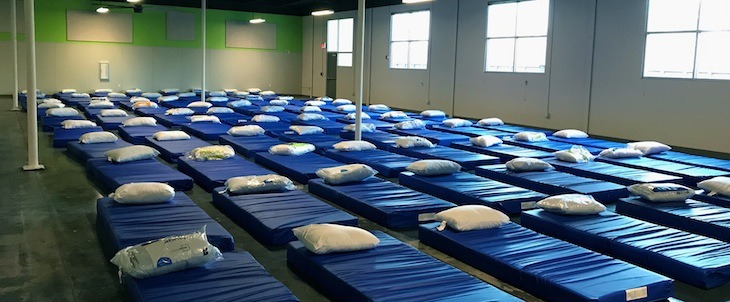Homeless campus director outlines site use, growth expectations
by January 29, 2018 5:38 pm 720 views

The Riverview Hope Campus opened Sept. 29, 2017.
Chris Joannides, executive director of Fort Smith’s Riverview Hope Campus, provided a status report and discussed goals for year two at a Monday (Jan. 29) meeting of the Future Fort Smith Committee.
Joannides, who took the job in March of 2017, had about six months to prepare for the 127,500-square foot facility’s opening day on Sept. 29. At that point, he expected the 85-bed location — which also houses a number of free services for the homeless including salon, laundry, mental health counseling, and healthcare — to be at full capacity by November or December.
On day four (Oct. 2), each bed was filled. Since that time, Riverview Hope Campus through private donations has added 20 additional beds and served an average of 10,000 meals per month – just over 330 a day compared to the 200 meals per day he was expecting in September comments to Talk Business & Politics.
“We only house 105 individuals, so we’re feeding 30 or 40 folks every day outside of the campus — non-residents.”
Joannides said the “beauty of the food program is that we’ve only spent $600 since the day that we opened on food, so my costs are only 2 cents a meal,” adding that the campus is only able to pull it off from donations.
“I do a Facebook post every couple of weeks, and by Wednesday, Thursday, Friday, Saturday, good individual citizens just come right through my front door and drop off a 50-pound bag of rice or whatever we’re needing. I had 1,600 pounds of chicken donated from a guy that I go to church with. IC (Immaculate Conception) School has donated some excess food that they’ve had to us. It just comes, and I’m thankful for it,” Joannides said.
When asked where the campus goes from here, Joannides said he hopes the campus can start on “phase two” — transitional apartments — by next year.
“From where I sit, I still would like to have more folks on campus, more community partners if you will, as well as inexpensive, low-income housing. We’ve talked about phase two someday — putting in transitional apartments. The beauty of my building is that I’ve only utilized 40,000 of a 125,000-square foot facility. I would really like to, once we’re 100% sustainable upfront, go to that phase two and build efficiency apartments,” Joannides said.
He continued: “I have lots of individuals that I’ll keep with me three or four or five months who still need a thumb on them, so to speak. They want that accountability and to be able to come home if they have a bad day, come into my office and say, ‘I’m thinking about drinking. Let’s talk about this.’ They want to be close enough to home, but have that independence, so to have 50 different studio apartments on-site would be nice.”
The site received its initial $3.9 million in funding through a variety of sources — $695,000 in grants from the Arkansas Development Finance Authority, $603,441 in Community Development Block Grants through the city of Fort Smith, a $500,000 grant from the Federal Home Loan Bank of Dallas, and hundreds of thousands in donations and in-kind services from the public, including $100,000 from the Griffin Family of Fort Smith and, just last month, an additional $5,000 contribution from BancorpSouth. Also, Mercy-Fort Smith committed $350,000 to help build and staff a clinic inside the building, and Joannides is continuing to pursue grant opportunities through state and federal funding sources to help defray costs on the annual operating budget of just under $500,000.
Joannides also said he wants to continue to “educate the public on how we can help these folks,” noting that if one sees someone homeless and hungry on the roadside, “I can assure you that at two cents a meal, I would rather you send them to me and let me feed them. I can offer them free housing. I can offer them free food. … We’re all here to serve a good purpose, and we all want to help these folks. But if we send them to the campus or to any other agency, for that matter, at least we’re assured somebody in that field is going to be helping them rather than just handing them $10 and praying that they’re putting it to good use.”
